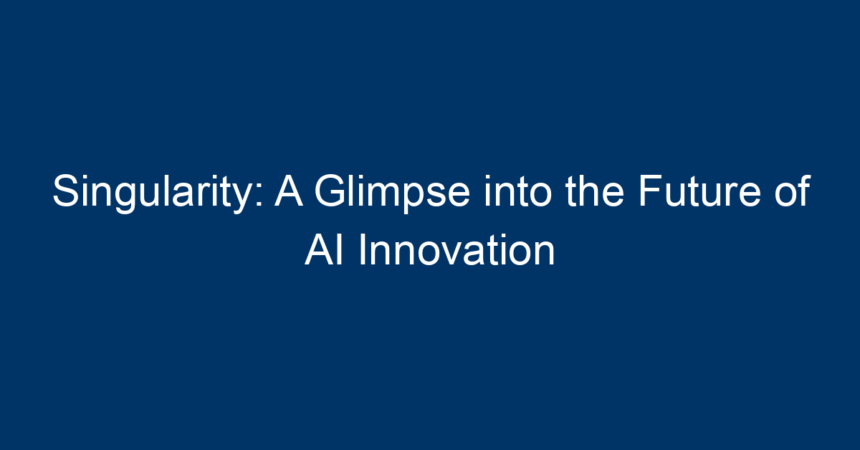Introduction
As we plunge deeper into the 21st century, one term continues to echo within technology circles and beyond: singularity. This concept, often discussed in the context of artificial intelligence (AI), suggests a future where machines surpass human intelligence, enabling unprecedented levels of innovation. But what does this really mean for society, the economy, and our everyday lives? In this article, we’ll explore the singularity, its implications for AI innovation, and what we can expect moving forward.
Understanding the Singularity
What is the Singularity?
The singularity refers to a hypothetical point in time when technological growth becomes uncontrollable and irreversible, resulting in unforeseeable changes to human civilization. This idea was popularized by futurists like Ray Kurzweil, who predicted that the singularity could occur by 2045. At this juncture, AI could potentially reach a level of sophistication far beyond current capabilities, transforming industries and altering our way of life.
The Roots of the Concept
The roots of the singularity can be traced back to various fields, including mathematics, physics, and engineering. In mathematics, a singularity represents a point at which a function ceases to be well-defined. In discussions of AI, it denotes a point beyond which human control may wane. This idea raises countless questions about our relationship with technology.
The Current State of AI Innovation
Exponential Growth of AI Technologies
AI innovation is accelerating at an unprecedented pace. From natural language processing to machine learning, technologies are evolving rapidly. The onset of big data and advanced algorithms has led to breakthroughs that were once considered the realm of science fiction. Today, AI governs many aspects of our lives—think personalized recommendations on streaming platforms or self-driving cars navigating busy streets.
AI Applications in Various Industries
The implications of AI stretch across multiple sectors:
- Healthcare: AI algorithms analyze vast amounts of medical data, aiding in diagnostics and personalized treatment plans.
- Finance: Financial institutions utilize machine learning for fraud detection and risk assessment.
- Retail: Retailers use AI to manage inventory, optimize pricing, and enhance customer experiences.
- Transportation: Autonomous vehicles are not just a dream; companies are actively testing self-driving technologies.
As these applications proliferate, the question arises: how close are we to the singularity?
The Path to the Singularity
The Role of Advanced Machine Learning
Machine learning is the backbone of AI innovations. It allows systems to learn from data patterns and improve over time without explicit programming. As algorithms become more sophisticated, they will be better equipped to tackle complex tasks, moving us closer to the singularity.
The Rise of Neural Networks
Neural networks, particularly deep learning architectures, are particularly adept at processing large datasets. These networks make decisions based on complex patterns, replicating, to some degree, human thought processes. As they evolve, we may find ourselves in a position where machines could independently solve problems and generate creative innovations that we couldn’t even conceive.
Quantum Computing: A Potential Game Changer
Quantum computing is another frontier that could hasten the arrival of the singularity. By performing computations at unprecedented speeds, quantum computers could analyze complex datasets much more efficiently than classical computers. This capability could lead to breakthroughs in various fields, further blurring the line between human and machine intelligence.
The Implications of the Singularity
Socioeconomic Transformations
The singularity has far-reaching implications for our economy and society. As AI takes over more tasks traditionally performed by humans, concerns about unemployment and wealth inequality arise. The need for reskilling and upskilling the workforce will be paramount, as entire industries will likely undergo transformation.
Ethical Considerations
With great power comes great responsibility. The singularity presents ethical dilemmas that cannot be ignored. Questions surrounding data privacy, algorithmic bias, and the moral implications of autonomous decisions will require careful consideration and proactive governance to ensure we harness AI for good.
The Future of Human-AI Collaboration
As we inch closer to the singularity, human-AI collaboration will become increasingly vital. Rather than viewing AI as a substitute for human input, we should see it as a tool that enhances our capabilities. This cooperative dynamic could lead to greater creativity and innovation, fostering a new era of discovery.
Preparing for the Singularity
Embracing Lifelong Learning
One of the most effective ways to prepare for the impending singularity is to embrace lifelong learning. As industries evolve, staying ahead of technological advancements will be crucial. Educational institutions and businesses can play a pivotal role by offering training programs focused on AI and emerging technologies.
Fostering Interdisciplinary Collaboration
The future of AI innovation lies in collaboration across disciplines. Engaging experts from fields like philosophy, ethics, engineering, and social sciences will provide a more holistic understanding of the challenges posed by the singularity. Interdisciplinary teams can ensure that diverse perspectives shape the future of AI.
Advocating for Ethical AI
As AI continues to evolve, advocating for ethical frameworks will be essential. Policymakers, technologists, and philosophers must collaborate to set guidelines for responsible AI development. Establishing clear boundaries and ethical standards will help mitigate potential risks associated with the singularity.
Conclusion
The singularity remains a contested but fascinating concept that captures the imagination and concerns of many. As we pave the way for future innovations in AI, understanding its potential implications is key. By embracing lifelong learning, fostering interdisciplinary collaboration, and advocating for ethical standards, we can prepare for a future where human and machine intelligence coexist harmoniously.
Actionable Insights
- Stay Informed: Regularly read up on developments in AI to understand its trajectory.
- Engage with Professionals: Network with experts and participate in discussions about ethical AI.
- Invest in Education: Consider courses and training that focus on AI competencies.
- Be Proactive: Advocate for responsible AI practices in your community and workplace.
As we approach this pivotal moment in technological history, being proactive in understanding and shaping the future of AI innovation will empower us to harness the potential of the singularity for the greater good.




